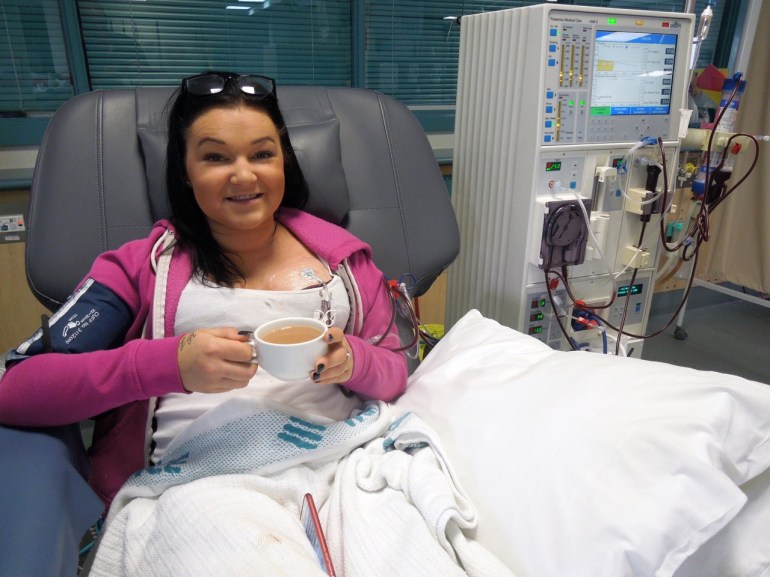‘Dying to Live.’
Illustrating the global appetite for on-demand cinema, Demand Film is growing fast in Australia and internationally, currently offering tickets to 550 events in seven countries.
Richard Todd’s feature documentary Dying to Live, which spotlights people who are awaiting life-saving organs, is among the best sellers in Australia, with 29 screenings now on sale and a further 10 being arranged in response to requests.
Supported by Screen Australia, Screenwest, Screen Queensland and Good Pitch Australia, Todd’s film has screened at the major Australian festivals, grossing $23,000, and it generated $7,500 from the first five on-demand screenings.
David Doepel, who co-founded Demand Film with Andrew Hazelton and Barbara Connell, hopes the film will end up making as much as $150,000 in Australia, observing: “We’re very pleased with the level of press we received for the film and the related ‘What would Jesus do?’ campaign, which is leading to requests for screenings.
“We anticipate a good finish to the year with the film and strong carryover into the new year as we engage with more and more advocacy groups. It has been a challenging campaign, which we knew it would be. The main way people deal with tough topics such as dying and organ donation being oneis to not talk about them. We are inviting people to do the exact opposite of that.
“We are finding however that as we fill up auditoriums and those patrons respond so positively to the film that the momentum is slowly building and requests are coming from the screenings being held as well as from the various advocacy and donor groups around the country.”
Todd’s Frackman, the saga of farmer Dayne Pratsky’s fight to have coal seam gas removed from his land, is among Demand Film’s top-10 titles, grossing $147,000. The film raked in a total of $360,00 including $21,000 from traditional cinemas and $192,000 from sponsored screenings and the Good Pitch-supported tour.
Doepel says: “It was actually Frackman and Toa Fraser’s The Dead Lands that validated the model of single event crowd-sourced screenings for us.”
Demand Film’s revenues are up 90 per cent on last year. Reflecting the overseas expansion, Australia/NZ represented 70 per cent of total sales in the last financial year. In the September quarter the split was 25 per cent ANZ and 75 per cent rest of the world. In that period the Australian business itself was up by 27 per cent.
Hazelton heads global business development and runs the US operation and the company has reps in the UK, Germany, New Zealand and Canada. Naina Sen’s The Song Keepers is about to launch in Germany and Karina Holden’s Blue is still having multiple screening in all Demand’s markets.
The Bikes of Wrath, Cameron Ford and Charlie Turnbull’s doc which follows five Australian friends as they attempt to cycle from Oklahoma to California in honour of the road trip undertaken by the Joad family of John Steinbeck’s novel ‘The Grapes of Wrath’, launches in the US in January.
Showing some titles have a long tale, screenings are still being arranged for Taryn Brumfitt’s body-image documentary Embrace, which was released in the UK in January 2017, and MAMIL (Middle Aged Men in Lycra!), Nickolas Bird and Eleanor Sharpe’s cycling documentary which came out last February.
Todd got the idea for Dying to Live when he saw an interview with Alan Turner, whose daughter died Zaidee at the age of seven, on Nine’s Today show in 2015. He discovered Zaidee was the only organ donor aged under 16 in Victoria at the time and that her parents had created Zaidee’s Rainbow Foundation to raise national awareness of organ and tissue donation.
According to surveys, eight out of 10 Aussies are willing to donate their organs but only 36 per cent have signed up for the donor organ registry. If the family doesn’t know the wishes of their loved ones, 50 per cent of those organs are wasted, he found. He estimates 1,400 Australians currently are waiting to either live or die.
The doc follows five people as they await organ transplants, during the operation, in recovery and life afterwards, and three donors. He hopes the film will prompt more people to sign up and encourage state and federal governments to better resource hospitals to facilitate more transplants.
The international distributor, the UK-based Sideways Film, started pitching both the feature and a one-hour version to buyers at MIPCOM.


